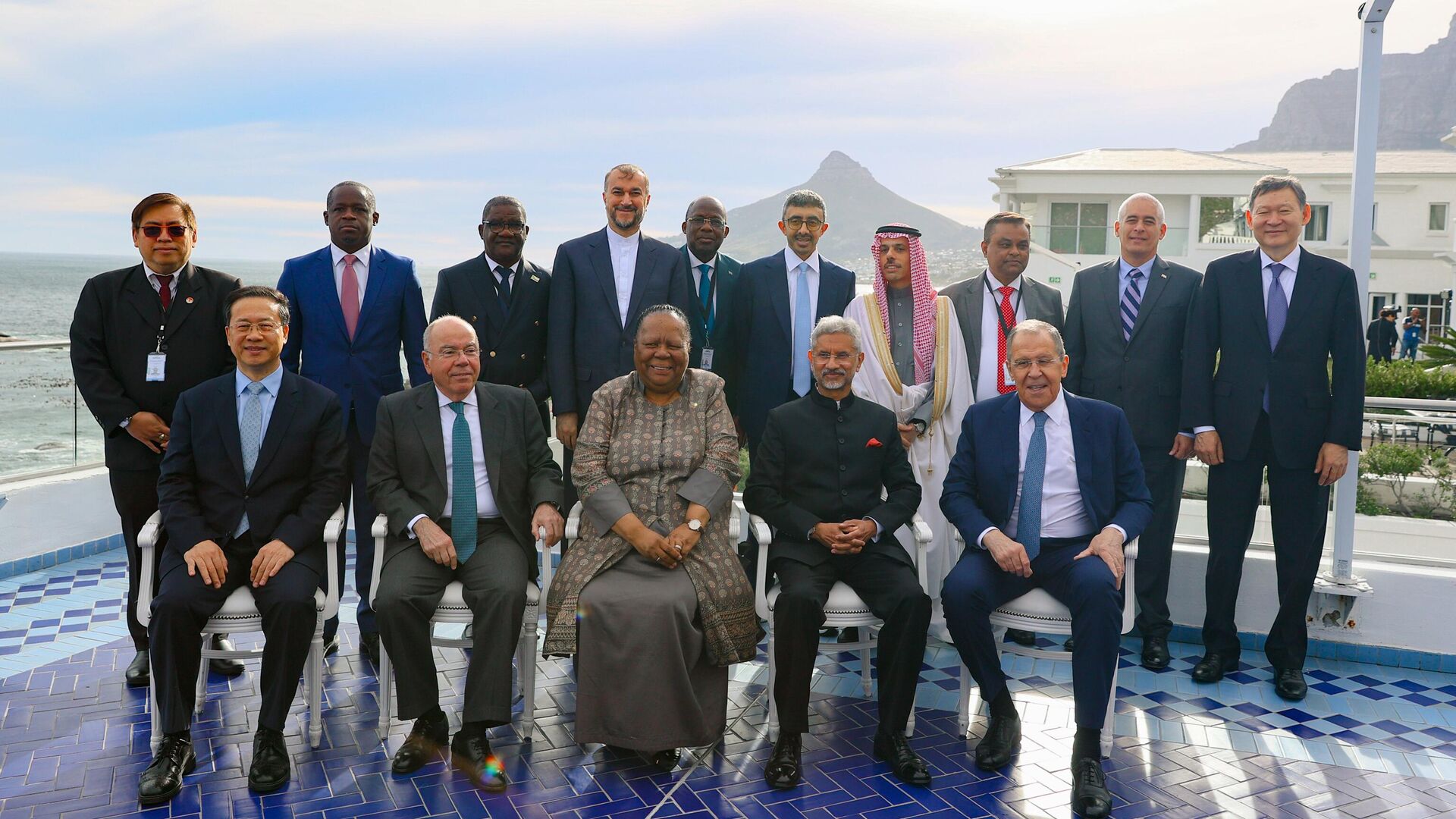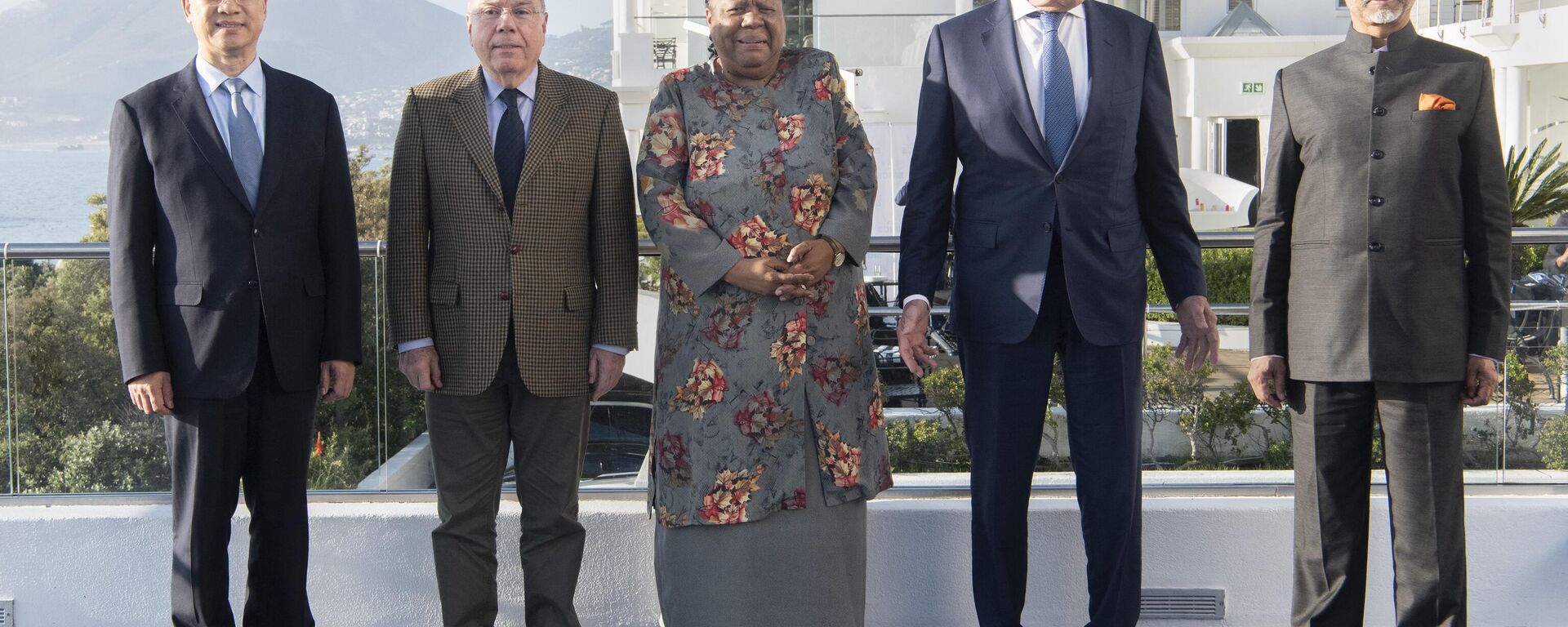https://en.sputniknews.africa/20230603/western-countries-afraid-emergence-of-brics-can-hasten-end-of-their-financial-reign-expert-says-1059683696.html
Western Countries Afraid Emergence of BRICS Can Hasten End of Their Financial Reign, Expert Says
Western Countries Afraid Emergence of BRICS Can Hasten End of Their Financial Reign, Expert Says
Sputnik Africa
Western countries fear the rise of a multipolar world, led in particular by the BRICS, which could put an end to American economic hegemony, Swiss political scientist, a member of Geneva's Grand Council Guy Mettan told Sputnik.
2023-06-03T14:53+0200
2023-06-03T14:53+0200
2023-08-03T10:49+0200
west
brics
southern africa
south africa
us dollar
ditching dollar
international
https://cdn1.img.sputniknews.africa/img/07e7/06/03/1059688009_0:160:3072:1888_1920x0_80_0_0_2f8e830d32533a82fd1656fd3ee8048f.jpg
Western countries fear the rise of a multipolar world, led in particular by the BRICS, which could put an end to American economic hegemony, Swiss political scientist and member of Geneva's Grand Council Guy Mettan told Sputnik Africa.De-dollarization has been set in motion, driven by emerging countries. It involves, for example, the use of local currencies for trade. In particular, China and India are attempting to internationalize the yuan and the rupee, by proposing partnerships to several African states.A similar logic is at work within the BRICS bloc, which is working on a common currency. This could be based on the "alliance of the five Rs" (national currencies of the BRICS member-states: Brazilian real, Russia's ruble, India's rupee, renminbi (or Chinese yuan) and South Africa's rand), or backed by natural resources such as oil, explained Guy Mettan. He also stressed that such a project would give "enormous confidence and momentum" to the group of five.On June 1, the BRICS foreign ministers met in Cape Town. Among other things, they discussed the expansion of the group to include several emerging countries that had applied for membership. Partnerships with the African continent to achieve "inclusive growth" were also at the heart of the discussions.
https://en.sputniknews.africa/20230602/1059668587.html
west
southern africa
south africa
Sputnik Africa
feedback@sputniknews.com
+74956456601
MIA „Rossiya Segodnya“
2023
Sputnik Africa
feedback@sputniknews.com
+74956456601
MIA „Rossiya Segodnya“
News
en_EN
Sputnik Africa
feedback@sputniknews.com
+74956456601
MIA „Rossiya Segodnya“
Sputnik Africa
feedback@sputniknews.com
+74956456601
MIA „Rossiya Segodnya“
western countries, multipolar world, brics countries, united states, brics ministers, new currency, ditching dollar, us dollar, west hegemony, saudi arabia, cape town
western countries, multipolar world, brics countries, united states, brics ministers, new currency, ditching dollar, us dollar, west hegemony, saudi arabia, cape town
Western Countries Afraid Emergence of BRICS Can Hasten End of Their Financial Reign, Expert Says
14:53 03.06.2023 (Updated: 10:49 03.08.2023) At the BRICS summit, which will take place in Johannesburg, South Africa, this August, one of the items up for discussion is likely to be the development of a currency to replace the US dollar. The member states emphasized the importance of this effort during the ministerial meeting on June 1.
Western countries fear the rise of a multipolar world, led in particular by the BRICS, which could put an end to American economic hegemony, Swiss political scientist and member of Geneva's Grand Council Guy Mettan told Sputnik Africa.
"The great fear of Europe and the United States is that if the BRICS emancipate, if a multipolar world emerges with other independent powers, it will mean the end not only of the military reign, but also of the financial reign of the United States. Because the supremacy of the dollar basically means getting a free income without paying the price," Mettan emphasized.
De-dollarization
has been set in motion, driven by emerging countries. It involves, for example, the use of local currencies for trade. In particular, China and India are attempting to internationalize the yuan and the rupee, by proposing partnerships to several African states.
"Some would now like to trade in currencies other than the dollar. It's a pleasant surprise, I'd say, for those who defend a slightly more independent, autonomous and sovereign vision of Africa, and for those who defend a multipolar world," Guy Mettan stated.
A similar logic is at work within the BRICS bloc, which is working on a common currency. This could be based on the "alliance of the five Rs" (national currencies of the BRICS member-states: Brazilian real, Russia's ruble, India's rupee, renminbi (or Chinese yuan) and South Africa's rand), or
backed by natural resources such as oil, explained Guy Mettan. He also stressed that such a project would give "enormous confidence and momentum" to the group of five.
On June 1, the BRICS foreign ministers met in Cape Town. Among other things, they discussed the expansion of the group to include several emerging countries that had applied for membership. Partnerships with the African continent to achieve "inclusive growth" were also at the heart of the discussions.


